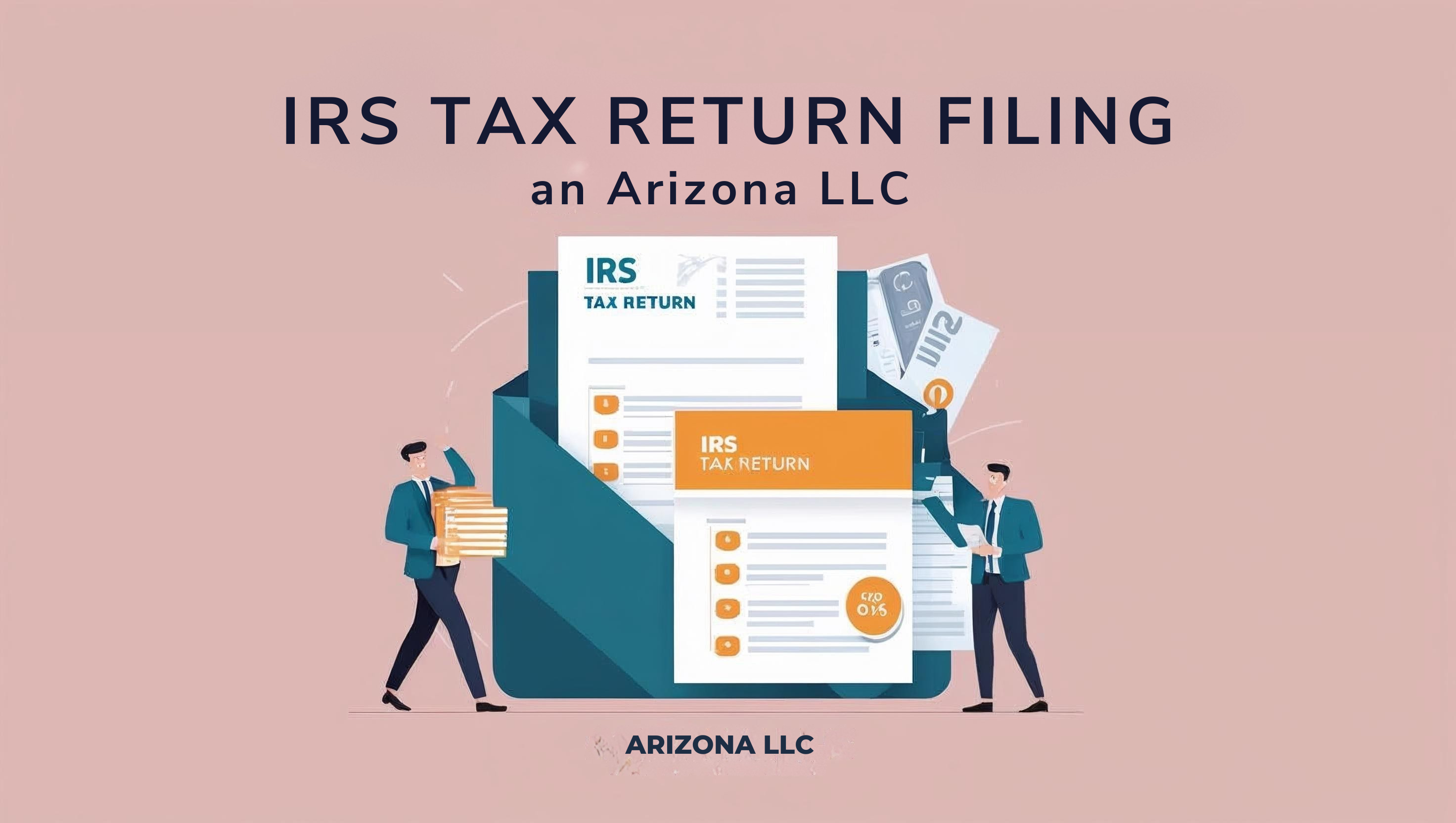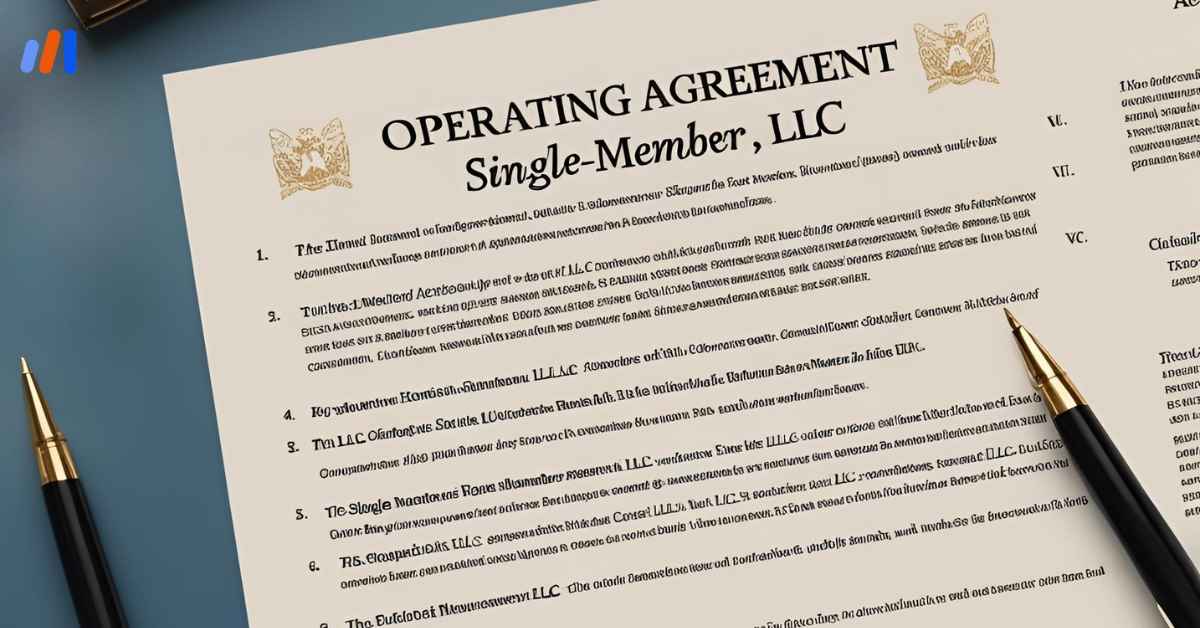You must remember that managing an LLC in Arizona entails a range of duties, filing taxes being one of them.
Every LLC, regardless of the number of partners, should be aware of both state and federal tax filing requirements to maintain compliance.
In this article, we will discuss the process of IRS tax return filing for Arizona LLC, focusing on classifying the taxes, reporting the taxes, deadlines, and other relevant details.
Federal Tax Filing Requirements for Arizona LLCs
Single Members LLC
The IRS does not recognize single-member LLCs as individual legal entities for tax purposes. This implies that;
- An LLC does not file a separate federal tax return
- The sole proprietor files their income and expenses under Schedule C of Form 1040.
If the LLC is engaged in rental real estate, you are permitted to use the following:
- Schedule E of Form 1040 for reporting rental income.
- Schedule F of Form 1040 for farming activities.
Multi-Member LLC
By default, a multi-member Arizona LLC is considered to operate as a partnership. It must:
- File Form 1065, U.S. Return of Partnership Income.
- Provide each member with a Schedule K-1 (Form 1065) so that they can report their income, along with the value of income, deductions, and credits claimed.
Each partner will then submit the K-1 information to the respective personal income tax return.
LLC Selecting To Be Taxed As A Corporation
For your Arizona LLC, once it elects to be treated as a corporation for federal tax purposes, you have to:
- Submit Form 1120 (C-Corporation) or
- Submit Form 1120S (S-Corporation, if you made the S-election with Form 2553).
Federal Tax Filing Deadlines
An owner of an Arizona LLC needs to comply with the federal tax submission timetables as set out by the IRS if they wish to avoid incurring penalties and interest. The submission deadlines are different depending on the type of tax entity that the LLC is classified as:
- Single Member LLC: Income and expenses are included on the owner’s return which is due on April 15.
- Multi-Member LLC (Partnership): Has a deadline for filing Form 1065 on the 15th day of the 3rd month after the tax year ends (March 15).
- LLC taxed as a Corporation (File Form 1120): Most often due April 15.
- LLC taxed as an S Corporation (File Form 1120S): March 15 is the deadline.
It is important to highlight that if the mentioned days are Saturdays, Sundays, or a public holiday, the deadline is moved to the next business day. Extensions can be filed, but must be submitted before the original deadline by using Form 7004.
Arizona State Tax Filing Requirements
Though LLCs in Arizona are not subject to a franchise tax, they must comply with state tax filing requirements relative to their federal tax classification. These guidelines assist in preserving the standing of your LLC and in averting this penalty risk from the state.
For Individual Members:
In the case that an LLC is taxed as a sole proprietorship or partnership, income received should be reported on Arizona Form 140 (Residents) or Form 140NR (Nonresidents). All earnings from the business operations conducted within the state are included.
For Corporate-Taxed LLCs:
- An Arizona LLC that elects to be taxed as a C-Corporation must file Form 120.
- An LLC taxed as an S-Corporation is mandated to file Form 120S.
The Arizona Department of Revenue (ADOR) uses these forms to determine the LLC’s revenue tax and business income tax liabilities for the entity.
Additional Tax Considerations
Transaction Privilege Tax (TPT)
TPT serves the same purpose as a sales tax, whereby businesses participating in specific taxable activities have to pay. If your LLC sells goods or provides taxable services in Arizona:
- You have to obtain a TPT License from the Arizona Department of Revenue.
- If the LLC’s annual gross revenue is above a certain threshold, filings are monthly, quarterly, or annually.
Failure to register or submit TPT returns may incur penalties, so timely registration and filing are critical.
Employer Taxes
An active LLC requires you to have employment tax obligations if you have employees:
- Register with the Internal Revenue Service and the Arizona Department of Economic Security (DES).
- Withhold and pay Arizona state income taxes and state unemployment insurance contributions.
- Complete and pay employment tax returns quarterly.
Fulfilling your compliance with employer responsibilities helps you evade fines and audits.
Tax Filing Deadlines
Besides federal deadlines, Arizona sets its standard for state tax submissions. A quick summary is provided below:
- Individual Tax Returns: Using Form 140 or 140NR, submission latest by 15th April.
- Corporate Tax Returns: On or before the 15th of the 4th month after the close of the corporation’s fiscal year.
- Transaction Privilege Tax (TPT): Based on filing frequency, due dates may fall on the 20th of the month following the reporting period.
- Payroll and Withholding Taxes: Mostly, the taxes are due quarterly, but it also depends on the amount of payroll.
Be sure to monitor the specific deadlines every year, since shifts happen because of weekends or holidays.
Not Filing Penalties
For Arizona LLCs, there are serious financial and legal repercussions for missing tax deadlines and not filing required documents. These include:
- IRS Penalties: There is a penalty of $205 per federal form that a partnership will pay each month for up to twelve months.
- Interest Charges: Interest accrued on unpaid state and federal tax balances.
- Arizona State Penalties: These represent additional penalties from underreporting income or late filings that are claimed by ADOR.
- Loss of good standing: Tax obligation noncompliance may result in losing good standing with the state which diminishes the ability to legally operate, obtain permits, and other licenses.
Reporting, along with filing documents with timeliness and accuracy, is essential for the good legal standing and financial health of the LLC.
Steps to Stay Compliant
Making sure the Arizona state tax obligations and federal tax obligations do not require work is an organized effort to fulfill these duties, as the laws are unbending. LLC owners can keep track of their obligations by:
Maintain Detailed Financial Records: Track receipts, income, expenses, and payroll regularly.
Understand Your Tax Classification: Make sure you know the approach used to tax your LLC at both the federal and state levels.
File all required returns in advance: Early preparation aids in reducing errors, and it is much better not to have to deal with deadlines.
Request the Required Registrations: In this case, it is a TPT license and associated employer accounts, if applicable.
Seek Tax Preparation Services: This is especially useful during the tax season or when there is a change in the business structure.
Observing these practices lowers the risk of being audited and ensures the LLC remains compliant year-round.
Get Expert Help With EasyFiling
Tax obligations for LLCs in Arizona can be complex, particularly if you are juggling other parts of your business. At EasyFiling, we help Arizona LLC owners professionally file their IRS returns and ensure compliance with federal and state obligations.
Our expert staff knows the specifics of Arizona businesses, including what tax forms to choose, and filing accuracy and timeliness. Whether you are a new LLC owner or trying to optimize compliance processes, we are here to help.
Do you need assistance with Arizona LLC tax returns? Contact EasyFiling today and let the experts handle the filing process on your behalf.
Conclusion
Your Arizona LLC does not have to overwhelm you when it comes to filing tax returns. By staying within the guidelines of both state and federal requirements, observing timelines, and keeping accurate bookkeeping records, the business can remain compliant and free of penalties.
Proactivity is crucial. Staying ahead of the paperwork, coupled with knowledge of filing dates, saves time, stress, and exposure to scrutiny from the IRS or ADOR. Whenever there are uncertainties in the process, it is ideal to reach out to professionals for assistance.
Frequently Asked Questions (FAQs)
Do LLCs in Arizona pay franchise tax?
Arizona has no LLC franchise tax, making it an appealing state for many business owners worried about recurrent state charges.
What happens if I am operating my LLC from another state but am registered in Arizona?
You’re still subject to Arizona’s tax laws as far as the LLC is registered there. You may also have tax responsibilities in your state of operation.
Is it possible to file taxes electronically for my Arizona LLC?
Yes, both federal and state taxes can be filed online. All major tax forms can be e-filed through the IRS, while the Arizona Department of Revenue has a dedicated portal for state tax filings.
Are there any special provisions for foreign-owned LLCs in Arizona?
Yes. Foreign single-member LLCs tend to such a high degree that they file Form 5472 and a Pro Forma 1120 annually with the IRS to declare reportable transactions. Not filing can lead to having to deal with harsh penalties.
Is it possible to file an extension for my Arizona LLC tax return?
Absolutely. Filing an extension at the federal level using Form 7004 grants you an automatic extension for Arizona. Just keep in mind that you still need to pay the estimated taxes by the original deadline to avoid any interest or penalties.
File Your LLC Today
25$ off with a coupon
Lock in EasyFiling's transparent rates and get lifetime compliance support at no extra cost.
Get Started Now









